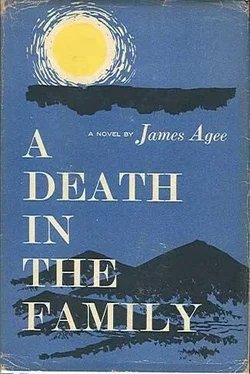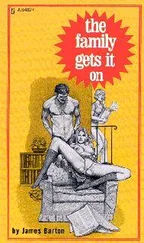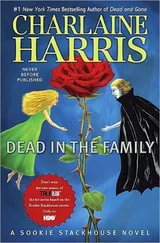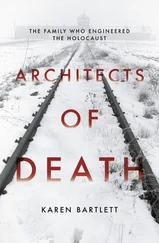"Children must not stare at their elders," he said. "That is ill-bred."
"Huh?" both of them asked. What's "stare," they wondered; "elders"; "ill-bred"?
"Say, 'Sir,' or 'I beg your pardon, Father.' "
"Sir?" Rufus said.
"You," Father Jackson said to Catherine.
"Sir?" Catherine said.
"You must not stare at people-look at them, as you are looking at me."
"Oh," Rufus said. Catherine's face turned red.
"Say, 'Excuse me, Father.' "
"Excuse me, Father."
"You," Father Jackson said to Catherine.
Catherine became still redder.
"Excuse me, Father," Rufus whispered.
"No prompting, please," Father Jackson broke in, in a voice pitched for a large class. "Come now, little girl, it is never too soon to learn to be little ladies and little gentlemen, is it?"
Catherine said nothing.
"Is it?" Father Jackson asked Rufus.
"I don't know," Rufus replied.
"I consider that a thoroughly uncivil answer to a civil question," said Father Jackson.
"Yes," Rufus said, beginning to turn cold in the pit of his stomach. What was "uncivil"?
"You agree," Father Jackson said. "Say, 'yes, Father.' "
"Yes, Father," Rufus said.
"Then you are aware of your incivility. It is deliberate and calculated," Father Jackson said.
"No," Rufus said. He could not understand the words but clearly he was being accused.
Father Jackson leaned back in their father's chair and closed his eyes and folded his hands. After a moment he opened his eyes and said, "Little boy, little sister" (he nudged his long blue chin towards Catherine), "this is neither the time nor place for reprimands." His hands unfolded; he leaned forward, tapping his right kneecap with his right forefinger, and frowning fiercely, said in a voice which sounded very gentle but was not, "But I just want to tell…" They heard Hannah on the stairs. "Children," he said, rising, "this must wait another time." He pointed his jaw at Hannah, raising his eyebrows.
"Will you come up, Father?" she asked in a shut voice.
Without looking again at the children, he followed her upstairs.
They looked each other in the eyes; their mouths hung open; they listened. It was as they had begun to expect it would be: the steps of two along the upper hallway, the opening of their mother's door, their mother's strangely shrouded voice, the closing of the door: silence.
Taking great care not to creak, they stole up to the middle of the stairs. They could hear no words, only the tilt and shape of voices: their mother's, still so curiously shrouded, so submissive, so gentle; it seemed to ask questions and to accept answers. The man's voice was subdued and gentle but rang very strongly with the knowledge that it was right and that no other voice could be quite as right; it seemed to say unpleasant things as if it felt they were kind things to say, or again, as if it did not care whether or not they were kind because in any case they were right, it seemed to make statements, to give information, to counter questions with replies which were beyond argument or even discussion, and to try to give comfort whether what it was saying could give comfort or not. Now and again their mother's way of questioning sounded to the children as if she wondered whether something could be fair, could possibly be true, could be so cruel, but whenever such tones came into their mother's voice the man's voice became still more ringing and overbearing, or still more desirous to comfort, or both; and their mother's next voice was always very soft. Aunt Hannah's voice was almost as clear and light as always, but there was now in it also a kind of sweetness and of sorrow they had not heard in it before. Mainly she seemed only to agree with Father Jackson, to add her voice to his, though much more kindly, in this overpowering of their mother. But now and again it seemed to explain more fully, and more gently, something which he had just explained, and twice it questioned almost as their mother questioned, but with more spirit, with an edge almost of bitterness or temper. And on these two occasions Father Jackson's voice shifted and lost a bit of its vibrancy, and for a moment he talked as rapidly in a circle, seeming to assure them that of course he did not at all mean what they had thought he meant, but only, that (and then the voice would begin to gather assurance); they must realize (and now it had almost its old drive); in fact, of course-and now he was back again, and seemed to be saying precisely what he had said before, only with still more authority and still less possibility of disagreement. And then their Aunt Hannah murmured agreement in an oddly cool, remote tone, and their mother's voice of acceptance was scarcely audible at all.
Once in a while when these voices came to crises in their subdued turmoil Rufus and Catherine looked into each other's cold, bright eyes which brightened and chilled the more with every intensification of the man's voice, and every softening and defeat of their mother's voice. But most of the time they only stared at the knob on their mother's door, shifting delicately on the stairs whenever they became cramped. They could not conceive of what was being done to their mother, but in his own way each was sure that it was something evil, to which she was submitting almost without a struggle, and by which she was deceived. Rufus repeatedly saw himself flinging open the door and striding in, a big stone in his hand, and saying, "You stop hurting my mother." Catherine knew only that a tall stranger in black, with a frightening jaw and a queer hat, a man whom she hated and feared, had broken into their house, had been welcomed first by Aunt Hannah and then by her mother herself, had sat in her father's chair as if he thought he belonged there, talked meanly to her in words she could not understand, and was now doing secret and cruel things to her mother while Aunt Hannah looked on. If Daddy was here he would kill him. She wished Daddy would hurry up and come and kill him and she wanted to see it. But Rufus realized that his Aunt Hannah and even his mother were on Father Jackson's side and against him, and that they would just put him out of the room and punish him terribly and go right on with whatever awful thing it was they were doing. And Catherine remembered, with a jolt, that Daddy would not come back because he was down at Grandma's and Grandpa's and now they would see him again and then they would never see him any more until heaven.
But suddenly there was a kind of creaking and soft thumping and the voices changed. Father Jackson's voice was even more strongly in charge, now, than before, although it did not seem that he was arguing, or informing, or trying to bring comfort, or even that he was speaking to either of the two women. Most of its theatrical resonance had left it, and all of its dominance. He seemed to be speaking as if to someone at least as much more assured and strong than he was, as he was more assured and strong than their mother was, and his voice had something of their mother's humbleness. Yet it was a very confident voice, as if it were sure that the person who was being addressed would approve what was said and what was asked, and would not rebuff him as he had rebuffed their mother. And in some way the voice was even more authoritative than before, as if Father Jackson were speaking not for himself but for, as well as to, the person he addressed, and were speaking with the power of that person as well as in manly humility before that person. Clearly, also, the voice loved its own sound, inseparably from its love of the sound and contour of the words it spoke, as naturally as a fine singer delights inseparably in his voice and in the melody he is singing. And clearly, although not one word was audible to the children, the voice was not mistaken in this love. Not a word was distinct from where they stood, but the shapes and rhythms and the inflections were as lovely and as bemusing as any songs they had ever heard. In general rhythm, Rufus began to realize, it was not unlike the prayers that Dr. Whittaker said; and he realized, then, that Father Jackson also was praying. But where Dr. Whittaker gave his words and phrases special emphasis and personal coloring, as though they were matters which required argument and persuasion, Father Jackson spoke almost wholly without emphasis and with only the subtlest coloring, as if the personal emotion, the coloring, were cast against the words from a distance, like echoes. He spoke as if all that he said were in every idea and in every syllable final, finished, perfected beyond disquisition long before he was born; and truth and eternity dwelt like clearest water in the rhythms of his language and in the contours of his voice; his voice accepted and bore this language like the bed of a brook. They looked at each other once more; Rufus could see that Catherine did not understand. "He's saying his prayers," he whispered.
Читать дальше












